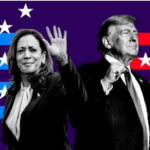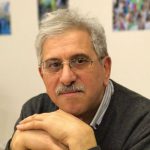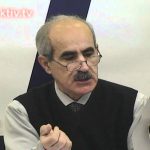Azerbaijan, the largest country in the Caucasus region, won the Eurovision Song Contest in Düsseldorf, Germany, on Saturday night. The next event in 2012 will bring an often forgotten country, which has seen its fortunes rise in recent years due to its plentiful natural resources, into the spotlight — as well as its human rights blemishes and democratic deficiencies.
 Azerbaijan is a country largely unknown around the world, but after investing heavily in its act this year, Ell/Nikki sang their way to victory for the Caucasus country at the final of the Eurovision Song Contest on Saturday night. The victory ensures that, for one week in 2012 at least, the capital city of Baku will be in the minds of the 125 million to 150 million viewers who tune into the competition.
Azerbaijan is a country largely unknown around the world, but after investing heavily in its act this year, Ell/Nikki sang their way to victory for the Caucasus country at the final of the Eurovision Song Contest on Saturday night. The victory ensures that, for one week in 2012 at least, the capital city of Baku will be in the minds of the 125 million to 150 million viewers who tune into the competition.
Singers Eldar Gasimov and Nigar Jamal, who form the act Ell/Nikki, won the competition with their song “Running Scared,” a Western-style, middle of the road R&B pop tune that was staged complete with a waterfall of fireworks.
Their win in Düsseldorf means that next year’s song contest will likely be held in the capital city of Baku. The city, which skirts the Caspian Sea, has experienced a massive construction boom in recent years because of its plentiful natural resources, and the contrasts in the Azerbaijani capital city are among the starkest in the region. The boom has seen a mass refurbishing of the historical city, part of which is a UNESCO world heritage site, and the arrival of European luxury boutiques to cater to an increasingly wealthy population.
Baku acts as a picture postcard of the country’s newfound prosperity, but also of its contrasts. Rusting Ladas evoking a Soviet past, which ended with a bloody confrontation with Russian troops in 1990 and eventual independence in 1991, can be seen in the streets alongside expensive Mercedes sedans. On some streets in the historic old town, you might be as likely to find expensive Caspian caviar as a döner kebab stand, the latter being a reminder of the country’s cultural links to Turkey.
40 Percent of Country Lives under Poverty Line
Outside of Baku, however, the country, which has 9 million people, is deeply impoverished. Forty percent of the country lives below the poverty line, earning an average of €24 per day. Much of the natural resources wealth is going to clans and the country’s elite, apparently with little trickle-down effect. It is also ruled by an authoritarian regime that has drawn persistent criticism from human rights groups like Amnesty International and Human Rights Watch for its repressive, anti-democratic policies.
Both Europe and the United States are often hushed in their criticism of Baku’s deficiencies — not least because they are partly dependent on Azerbaijan for their energy needs. The country is home to known energy reserves of around a billion barrels of oil and 1.3 trillion cubic meters of natural gas. Millions of barrels of Azerbaijani gas and oil are pumped to the West each year through a pipeline that runs from Baku to the Mediterranean Sea port of Ceyhan in Turkey. Europe is also planning to invest billions to finance construction of the massive Nabucco pipeline to pump natural gas from Baku to continental Europe in an effort to create greater independence from Russia.
Azerbaijan is also part of the European Union’s European Neighborhood Policy program and received €92 million between 2007 and 2010 in EU aid, with another €122.5 million in funding slated between 2011 and 2013. The EU has stated that the primary aim of its aid to Baku is “democratic development and good governance,” but Human Rights Watch alleges that “the EU’s criticism of (Baku’s) authoritarian leadership has been largely muted.” It adds that Baku has a history of threatening, harassing and imprisoning journalists and has even defied a European Court of Human Rights order to release the editor of two independent publications. The group claims the publications were forced to close after his imprisonment in 2007 “on bogus defamation and terrorism charges.” And in order to prevent the kind of protest waves seen in North Africa this spring, HRW claims authorities arrested a social media activist who had tried to organize an Azerbaijani “day of rage” via Facebook.
Comparisons to Medieval Feudalism
Amnesty International describes Azerbaijan as a country that uses criminal and defamation laws in order to “silence criticism.” It also notes that freedom of assembly is heavily restricted in the country, with demonstrations banned in Baku’s city center.
The country is ruled by President Ilham Aliyev, who became the country’s leader after power was essentially handed over to him in 2003 by his father, dictator Heydar Aliyev, before his death. Even today, Heydar Aliyev, who ruled from 1993 to 2003, is a regular presence in the capital city, with his face splashed on propaganda billboards across Baku.
The Economist, with its annual Democracy Index, considers Azerbaijan to have an “authoritarian regime.” SPIEGEL itself has written that Azerbaijan “is rife with corruption and comparisons to European feudalism in the Middle Ages are hardly a stretch.”
SPIEGEL also described Azerbaijan as “an embarrassing partner” for the West to have. A December 2010 report published in conjunction with the release of US diplomatic cables stated that “the country’s corrupt institutions are unable to deal with the oil boom and the billions of dollars it brings into the county, while the average annual growth rate of almost 15 percent is a much higher priority than enforcing and improving law and order. Independent media outlets are restricted, and dissidents are violently suppressed.”
Challenges for 2012
Another issue that could affect the event could be the long-going conflict between Azerbaijan and Armenia, which is likewise a member of the European Broadcast Union (EBU), the association of national broadcasters in Europe and beyond that organizes the Eurovision Song Contest. The two countries have been involved for several decades in the conlict over Nagorno-Karabakh, a disputed breakaway region of largely ethnic Armenians that has claimed 30,000 lives and displaced a million people. Following a short war, a cease-fire has been in place since 1994, but no solution to the conflict is in sight. Relations remain very tense between the countries and years of peace talks have failed to reach a resolution. Armenia has not yet indicated whether it will participate in 2012 or boycot the competition.
Then there is the issue of homosexuality. Many of the fans who travel to the Eurovision Song Contest each year or view it on television are gay or lesbian. Although homosexuality is not illegal in Azerbaijan, it is not a society that encourages open gayness. As Düsseldorf’s Rheinische Post newspaper notes, Germany’s Foreign Ministry — in a travel advisory that also states that a maximum of 125 grams of caviar can be taken out of the country — warns: “Homosexuality may not be expressly punishable, but it cannot be ruled out that the police might arrest a homosexual couple and only release them after the payment of a sum of money.” Britain’s Foreign Office has a slightly milder advisory, noting that “homosexual, lesbian and transgender activity is legal in Azerbaijan, but many Azerbaijanis disapprove of public displays of affection.”
Of course, democracy and liberal values are no precondition for membership in the EBU. Belarus, home to Europe’s last dictator, Alexander Lukashenko, also made it to the semi-finals at Eurovision before being eliminated from the competition.
An act like Ell/Nikki has no link to their government’s repressive policies, other than support for their music. Gasimov and Jamal won the jury and popular vote on Saturday based on their talent and the quality of their performance. But as hard as the EBU attempts to distance itself from politics, it is almost impossible to remove political issues from a competition between nations — especially if the organization’s roster of members includes countries that do not recognize the definition of democracy exercised by those in the West that established and held the first Eurovision Song Contest in 1956.
Next year, the spotlight will be on Azerbaijan with both its boom and its youthful success with Ell/Nikki, but also its political and human rights blemishes. The song contest could be a Grand Prix opportunity for Baku to show a new face of prosperity and success, and for Azerbaijan to polish its reputation. Perhaps the extra international attention will prompt the government to allow more freedoms and put pressure on the regime to better its human rights record.
But the event could also leave Eurovision running scared if the government doesn’t take action to improve its international image. For EBU, the event will require a master stroke of diplomacy.
Spiegel



